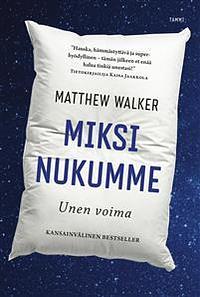Take a photo of a barcode or cover
hopeful
informative
inspiring
reflective
fast-paced
This was an interesting read - very accessible to a general audience. Dr. Walker has spent his career studying sleep - why we need sleep, the consequences of not getting enough sleep. He does a really good job of explaining and lots and lots of studies - and explaining why some of those studies are more valid than others.
There's not much about how to get better sleep - although, his arguments are compelling enough I'm looking into sleep studies for myself and one of my children. He has very strong arguments for making societal changes that would improve our sleep -- flexible work schedules to accommodate different sleep styles (night owls vs. morning larks), later school start times especially for high school, better education about the importance of sleep and dangers of drowsy driving, and better sleep environments for hospital patients.
There's not much about how to get better sleep - although, his arguments are compelling enough I'm looking into sleep studies for myself and one of my children. He has very strong arguments for making societal changes that would improve our sleep -- flexible work schedules to accommodate different sleep styles (night owls vs. morning larks), later school start times especially for high school, better education about the importance of sleep and dangers of drowsy driving, and better sleep environments for hospital patients.
informative
medium-paced
informative
reflective
relaxing
medium-paced
I can't recommend this book enough. Ironically it was difficult to get through because it motivated me to fall asleep earlier with the guilt tripping evidence it provided against getting less than 7 hours of sleep.
You need to read this book.
Sleep. We take it for granted. We feel guilty about getting too much of it. In the military, they condition us to scoff that we'll do it when we're dead.
We're doing it wrong.
In 'Why We Sleep,' Berkeley neuroscientist Matthew Walker explains what sleep actually does - and what wakefulness prevents it from doing. It makes a powerful, fact-based argument for prioritizing sleep, calling proper sleep a "miracle drug" and the "single best thing we can do for our health." I don't disagree. Read this book and you won't, either.
'Why We Sleep' is exquisitely researched, effectively argued, and potentially life-changing. I urge you to read it today.
Sleep. We take it for granted. We feel guilty about getting too much of it. In the military, they condition us to scoff that we'll do it when we're dead.
We're doing it wrong.
In 'Why We Sleep,' Berkeley neuroscientist Matthew Walker explains what sleep actually does - and what wakefulness prevents it from doing. It makes a powerful, fact-based argument for prioritizing sleep, calling proper sleep a "miracle drug" and the "single best thing we can do for our health." I don't disagree. Read this book and you won't, either.
'Why We Sleep' is exquisitely researched, effectively argued, and potentially life-changing. I urge you to read it today.
informative
inspiring
reflective
slow-paced
Everybody should read this book. I had a general idea that getting good sleep was good for your health, etc., but I had no idea just how critical it is to basically every function your brain and body perform.
This book is written by a sleep scientist, and I am utterly impressed with how accessible and readable it is. No one should have a problem understanding this book, and no one should be bored while reading this book. The author even gets beautifully poetic at times. Their passion for the topic is palpable.
If you want an insight into the fundamental way sleep impacts life and society, and are curious about ways to improve a lot of things for yourself and your well-being, you will want to read this book.
This book is written by a sleep scientist, and I am utterly impressed with how accessible and readable it is. No one should have a problem understanding this book, and no one should be bored while reading this book. The author even gets beautifully poetic at times. Their passion for the topic is palpable.
If you want an insight into the fundamental way sleep impacts life and society, and are curious about ways to improve a lot of things for yourself and your well-being, you will want to read this book.
An interesting read. I certainly learned a lot about sleep and it’s made me think about my sleep habits. More critically, I felt it was uncomfortably alarmist. The book makes a lot of claims. Perhaps the science backs up those claims, perhaps it doesn’t. One area I struggled with was references. There were a lot fewer than I expected. If you discuss any kind of trial, why wouldn’t you reference it so that readers check the data for themselves?
informative
slow-paced



